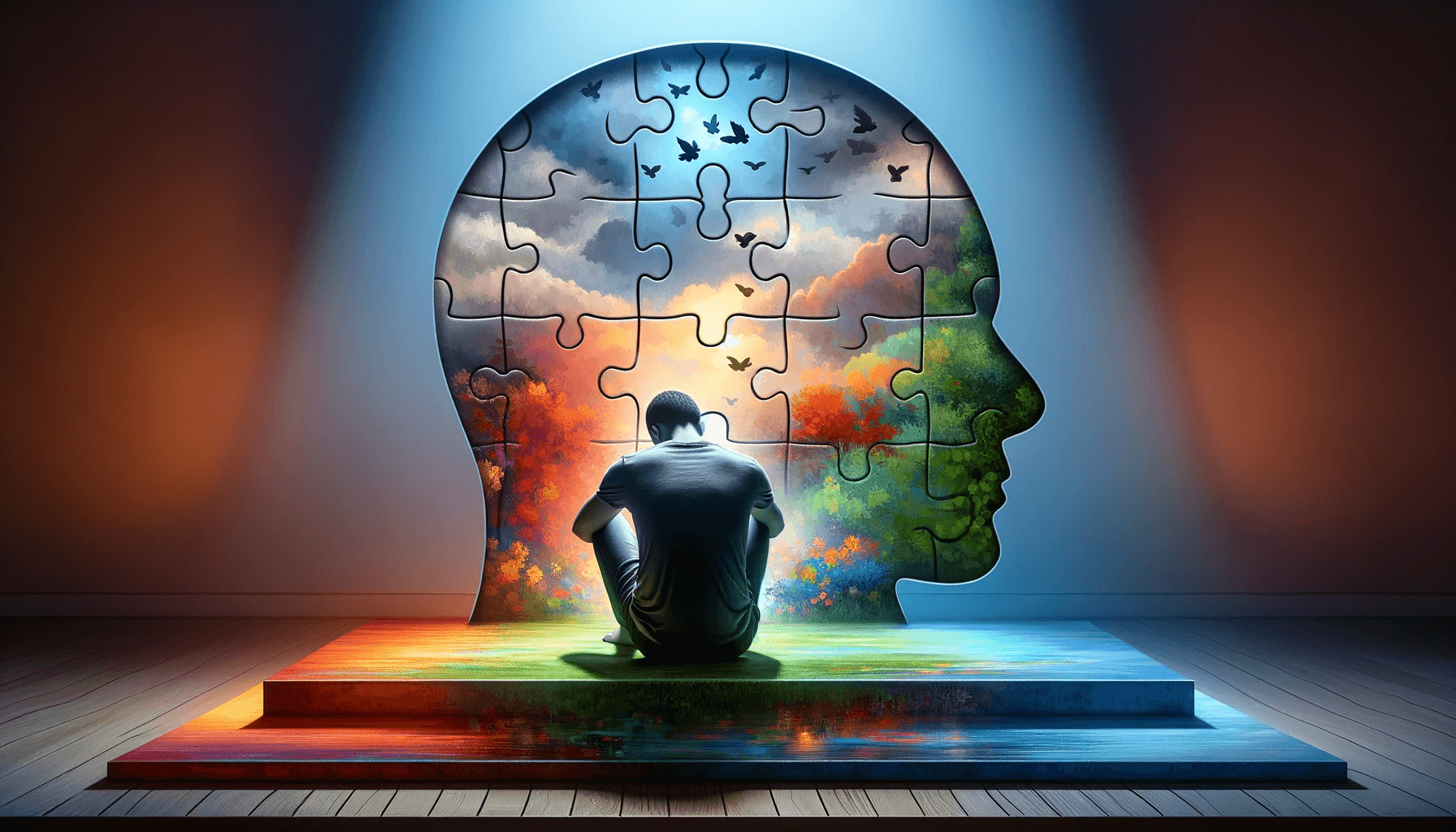Sponsor Awaken Your Great Self
Table of Contents
Introduction
Depression is a complex mental health condition that affects millions of people worldwide. While some individuals may openly express their sadness and despair, others may conceal their emotions, making it challenging to identify their struggles. This article aims to shed light on concealed depression, exploring its signs, its impact on daily life, ways to support those experiencing it, and the importance of seeking professional help. Additionally, we’ll discuss self-care strategies and resources available for individuals battling concealed depression.
Understanding Concealed Depression
Concealed depression is where individuals hide their depressive symptoms, often putting on a facade of happiness or normalcy. Unlike traditional depression, where symptoms may be more apparent, concealed depression can be challenging to detect. It is crucial to understand that suppressing depression does not mean the condition is less severe. Individuals struggling with concealed depression may experience the same emotional pain and suffering as those with more overt symptoms.
Signs and Symptoms of Concealed Depression
Recognizing the signs and symptoms of concealed depression is essential in supporting individuals who may be silently battling this condition. While each person may exhibit unique symptoms, there are some common clues to look out for.
- Behavior change: Individuals with concealed depression may become more withdrawn and isolated, avoiding social interactions they once enjoyed. They may also experience sudden mood swings, going from seemingly happy to irritable or sad without apparent cause.
- Physical complaints: Unexplained physical symptoms, such as headaches, stomachaches, or fatigue, may be signs of concealed depression. These physical complaints often have no underlying medical cause and can persist for an extended period.
- Difficulty concentrating: Concealed depression can impair an individual’s ability to focus and concentrate on tasks, leading to decreased productivity and performance at work or school.
- Changes in appetite: Fluctuations in appetite, either overeating or loss of appetite, can be indicative of concealed depression. Individuals may turn to food as a coping mechanism or lose interest in eating altogether.
- Sleep disturbances: Insomnia or excessive sleeping can be signs of concealed depression. Individuals may struggle to fall asleep or stay asleep throughout the night, leading to feelings of fatigue and exhaustion during the day.
- Emotional masking: Those with concealed depression often excel at hiding their genuine emotions. They may put on a cheerful facade, making it difficult for others to recognize their internal struggles.
- Loss of interest: A significant loss of interest in activities once enjoyed can be a sign of concealed depression. Hobbies, socializing, or pursuing personal goals may no longer bring pleasure or fulfillment.
- Feelings of hopelessness: Concealed depression often leads to feelings of hopelessness and despair. Individuals may struggle to see a future beyond their current emotional state.
The Impact of Concealed Depression on Daily Life
Concealed depression can profoundly impact an individual’s daily life, affecting various aspects, including work, relationships, and overall well-being. The internal battles faced by those with concealed depression can make it challenging to function optimally in these areas. Some common effects of concealed depression include:
1. Work Performance: Individuals with concealed depression may struggle to maintain productivity and focus. The constant emotional turmoil can lead to decreased motivation, concentration difficulties, and increased absenteeism.
2. Relationships: Concealed depression can strain relationships, as individuals may isolate themselves from social interactions. Friends and family members may find it challenging to understand the emotional distance and changes in behavior, leading to strained connections.
3. Physical Health: Concealed depression can manifest as physical symptoms, such as chronic pain, headaches, and digestive issues. The constant emotional distress takes a toll on the body, leading to a compromised immune system and increased vulnerability to illnesses.
4. Emotional Well-being: Those with concealed depression often experience overwhelming sadness, anxiety, and a sense of emptiness. These emotions can make it challenging to experience joy, maintain healthy self-esteem, and find meaning in life.
How to Support Someone with Concealed Depression
If you suspect that someone you know is battling concealed depression, it is crucial to offer them support and understanding. Here are some strategies to help someone with concealed depression:
1. Be a Good Listener: Create a safe and non-judgmental space for individuals to express their emotions. Encourage open communication and listen actively without interrupting or offering solutions.
2. Educate Yourself: Take the time to learn about depression and its symptoms. This will help you understand what the person may be experiencing and provide more informed support.
3. Show Empathy: Validate their feelings and tell them you understand their struggles. Avoid belittling their emotions or offering dismissive advice like “just cheer up” or “snap out of it.”
4. Offer Practical Help: Assist with daily tasks or responsibilities that may feel overwhelming for someone with concealed depression. This could include grocery shopping, cooking meals, or helping with childcare.
5. Encourage Professional Help: Gently suggest seeking professional help, such as therapy or counseling. Offer to help them find a therapist or accompany them to their appointments if they feel comfortable.
6. Be Patient: Healing from concealed depression takes time. Avoid putting pressure on the individual to “get better” quickly. Offer your support and let them know you are there for them, no matter how long it takes.
Seeking Professional Help for Concealed Depression
While support from friends and loved ones is invaluable, seeking professional help is crucial for individuals battling concealed depression. Mental health professionals have the expertise to provide an accurate diagnosis and develop a personalized treatment plan. Here are some reasons why professional help is essential:
1. Accurate Diagnosis: Mental health professionals can accurately diagnose concealed depression, ensuring that individuals receive appropriate treatment tailored to their needs.
2. Therapy and Counseling: Therapists and counselors provide a safe space for individuals to explore their emotions, develop coping strategies, and work towards healing. Various therapeutic approaches, such as cognitive-behavioral therapy (CBT), can effectively treat concealed depression.
3. Medication: In some cases, medication may be recommended to manage the symptoms of concealed depression. Mental health professionals can prescribe and monitor the appropriate medication regimen if necessary.
4. Supportive Environment: Mental health professionals create a supportive and non-judgmental environment where individuals can openly express their emotions and concerns. This can be particularly helpful for those who need to conceal their depression from others.
Self-Care Strategies for Managing Concealed Depression
In addition to seeking professional help, individuals battling concealed depression can incorporate self-care strategies into their daily routine to manage their condition. Here are some effective self-care practices:
1. Prioritize Physical Health: Regularly exercise, eat a balanced diet, and ensure adequate sleep. Physical well-being is closely linked to mental health.
2. Practice Mindfulness and Meditation: Cultivate mindfulness by focusing on the present moment and practicing meditation. Mindfulness helps individuals become more aware of their emotions and reduces stress levels.
3. Engage in Relaxation Techniques: Explore relaxation techniques such as deep breathing exercises, progressive muscle relaxation, or hobbies promoting relaxation and joy.
4. Build a Support System: Surround yourself with understanding and supportive individuals who uplift and encourage you. Join support groups or online communities where you can connect with others going through similar experiences.
5. Set Realistic Goals: Break down tasks into smaller, manageable steps to avoid feeling overwhelmed. Celebrate even the most minor achievements to boost your self-esteem and motivation.
6. Engage in Activities You Enjoy: Engaging in activities that bring joy and fulfillment is essential for managing concealed depression. Make time for hobbies, creative outlets, and activities that nourish your soul.
The Importance of Destigmatizing Concealed Depression
Concealed depression often carries a heavy burden of stigma and misconceptions. It is crucial to destigmatize this condition to encourage open conversations and promote understanding. Here’s why destigmatization is vital:
1. Encourages Seeking Help: Destigmatizing concealed depression helps individuals feel more comfortable seeking professional help without fear of judgment or prejudice.
2. Fosters Empathy and Support: Breaking down the stigma surrounding concealed depression promotes empathy and understanding. This creates a supportive environment where individuals feel safe sharing their struggles.
3. Raises Awareness: By destigmatizing concealed depression, we can raise awareness about its prevalence and educate the public about its signs, symptoms, and available resources.
4. Prevents Isolation: Stigma often leads to isolation and feelings of shame. Destigmatization encourages individuals to reach out for support, reducing the sense of isolation commonly associated with concealed depression.
Resources and Support for Individuals with Concealed Depression
If you or someone you know is battling concealed depression, it is essential to know that help is available. Here are some resources and support options:
1. Mental Health Hotlines: Helplines such as the National Suicide Prevention Lifeline (1-800-273-TALK) provide immediate support and guidance for individuals experiencing a mental health crisis.
2. Therapists and Counselors: Licensed mental health professionals specialize in treating depression and can provide the necessary support and guidance.
3. Support Groups: Joining support groups, whether in-person or online, can provide a sense of community and understanding. Sharing experiences with others who face similar challenges can be incredibly healing.
4. Mental Health Websites and Apps: Numerous websites and apps offer valuable information, self-help resources, and tools for managing depression. Some famous examples include NAMI (National Alliance on Mental Illness) and Headspace.
5. Friends and Family: Lean on your support system of friends and family members. Open up about your struggles and allow them to provide your support and understanding.
Conclusion
Concealed depression is a challenging mental health condition requiring attention and understanding. By recognizing the subtle clues, offering support, and promoting destigmatization, we can create a society that embraces open conversations about mental health. Remember, if you or someone you know is battling concealed depression, reach out for help. You are not alone, and resources are available to support you on your journey towards healing and recovery.
If you or someone you know is struggling with concealed depression, don’t hesitate to contact a mental health professional or a helpline in your country.




